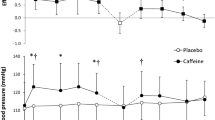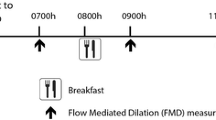Abstract
Objective: To examine age-related differences in blood pressure, heart rate, behavioral mood state and norepinephrine kinetics after caffeine ingestion in younger and older men.
Design: Placebo-controlled, double-blind study.
Setting: General Clinical Research Center, University of Vermont.
Subjects: 10 older (O) (65–80 y) and 10 younger (Y) (19–26 y) healthy men who were moderate consumers of caffeine (Y=126±30 mg/d; O=160±44 mg/d:NS; mean±s.e.m.).
Intervention: All volunteers were characterized for fasting plasma glucose, insulin and caffeine levels, body composition, anthropometry, physical activity, and energy intake. Before and after placebo and caffeine ingestion (5 mg/kg fat-free mass) test days, the following variables were measured in all subjects: heart rate, blood pressure, mood state, and norepinephrine concentrations (NEconc), appearance (NEapp) and clearance (NEcl).
Main outcome measures: Systolic and diastolic blood pressure, heart rate, mood state, and norepinephrine kinetic responses to placebo and caffeine ingestion.
Results: Following caffeine ingestion, plasma caffeine levels were similar in Y and O men. Systolic (SBP) and diastolic (DBP) blood pressure increased significantly (P<0.01) from baseline by 9% (130±6 vs 142±6 mmHg) and 3% (75±3 vs 77±3 mmHg), respectively, in O men following caffeine ingestion, but remained unchanged in Y men. Self-reported feelings of tension (P<0.05) and anger (P=0.06) decreased in O men, while anger tended to increase in Y men (P<0.06) following caffeine ingestion. Heart rates in both groups were unaltered following caffeine ingestion. No differences were noted at baseline between O and Y men for NEconc, NEapp and NEcl. After caffeine ingestion, NEconc were significantly greater in O than Y men, whereas NEapp and NEcl rates did not differ from baseline in either group. Blood pressure and subjective mood state effects of caffeine were not related to changes in norepinephrine kinetics.
Conclusion: Age may play a role in augmenting blood pressure response and reducing subjective feelings of anger and tension following caffeine ingestion, suggesting that the elderly are more reactive to the pressor and less sensitive to the subjective effects of the drug. These effects do not appear to be mediated by changes in sympathetic nervous system activity.
Similar content being viewed by others
Author information
Authors and Affiliations
Rights and permissions
About this article
Cite this article
Arciero, P., Gardner, A., Benowitz, N. et al. Relationship of blood pressure, heart rate and behavioral mood state to norepinephrine kinetics in younger and older men following caffeine ingestion. Eur J Clin Nutr 52, 805–812 (1998). https://doi.org/10.1038/sj.ejcn.1600651
Received:
Revised:
Accepted:
Published:
Issue Date:
DOI: https://doi.org/10.1038/sj.ejcn.1600651
- Springer Nature Limited
Keywords
This article is cited by
-
Greater Coffee Intake in Men Is Associated With Steeper Age-Related Increases in Blood Pressure
American Journal of Hypertension (2011)
-
The effect of caffeine, green tea and tyrosine on thermogenesis and energy intake
European Journal of Clinical Nutrition (2009)




